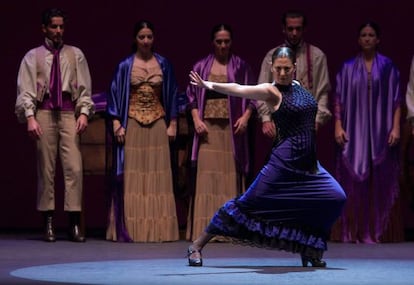Sara Baras returns to Cádiz stage to honor "La Pepa"
Flamenco dancer's new work is inspired by Spain's 1812 Constitution

Almost two years after she bade a temporary farewell to flamenco there, dancer Sara Baras returned to the stage of the Gran Teatro Falla in Cádiz on Monday with the premiere of a work inspired by the signing, 200 years ago in the city, of the 1812 Spanish Constitution, popularly known as "La Pepa."
And La Pepa is both the name of the show, which runs until March 23, and of its main character, portrayed by Baras herself. It's another role to be added to the gallery of women she has played in three of her previous works - Juana la Loca, Mariana Pineda and Carmen.
"The other three have marked my life in a tremendous way, but now I am La Pepa," she says emphatically, like someone who has entered the body of a virtual being that now feels like her own.
For Baras, La Pepa has all the qualities of the woman that she is, but at the same time she is also conscious that she is a product of an abstraction, an allegory.
"Our Pepa is a feeling, a way of being, something that lifts the air, she is the voice of the people in the body of a woman, but a woman who has skin," Baras explains.
She describes the role with a conviction that makes her eyes bulge. After spending several months coming up with the character, it is now difficult for her to stop when she speaks about her, and of her control, which in some way even seduces the president of the Cádiz parliament, played by Baras' partner José Serrano.
And lastly, added to the creation of the character is the new outlook on things she admits to having after recently becoming a mother.
"This past year and a half has been the best I have had in my life," she says without forgetting to mention her baby, in case there were any doubts.
Baras admits she has had more time than ever to read, think and "the greatest freedom in the world to dream."
But even though she has researched this show in a way she had not done with her other works, she says it is the air of the land and "the specialness of the people from here" that has most inspired her.
Baras may have left Cádiz while still a teenager, but she has never lost sight of its bay. Although, as the dancer and choreographer recalls, her company was born in Cádiz with Sensaciones in 1998, its present form is all about a new and unique experience.
And without a doubt what has contributed to that is the fact that the first steps of the show have been created in the heart of the neighborhood most synonymous with flamenco in the city, Santa María.
The company has been heading to the area's La Merced flamenco center every morning since last December at hours that Baras admits are nothing like flamenco ones.
It is the strict Baras - "the Barosky," as Lluis Pascual defines her - who gets up at seven in the morning and demands the same effort from her company that she herself makes; but it is also the sensitive one, who admits having been excited about putting on this piece since almost the beginning.
Not far from these emotions is the fact that the dancer has surrounded herself with a young and almost entirely local cast for the show that has made an impact on her.
She could speak about the surprises the dance troupe and the singers have given her, but she cannot avoid pausing to mention the person to whom she has delegated the music for the show, the guitarist Keko Baldomero, highlighting not only his flexibility, but also his ability to make the old sound new.
Baras' script for La Pepa takes place across time and travels from the Peninsula War and the days of the Cádiz parliament - with its port, its cafés and its tertulias (public cultural and political discussions) - to the present day. And around that plot different flamenco styles, the ones that the action demanded - seguiriyas and guajiras, martinetes and zapateado, malagueña and soleá por bulerías - gradually placed themselves in a "natural way," says Baras.
She does not think the show's historical basis and its inspiration in Cádiz should be any obstacle for taking it beyond the land that will see its birth.
"Something as big as the ability for you to feel free is born from here," she says.
"La Pepa carries that spirit. Its energy and its heart will reach into every last corner," she predicts.
Tu suscripción se está usando en otro dispositivo
¿Quieres añadir otro usuario a tu suscripción?
Si continúas leyendo en este dispositivo, no se podrá leer en el otro.
FlechaTu suscripción se está usando en otro dispositivo y solo puedes acceder a EL PAÍS desde un dispositivo a la vez.
Si quieres compartir tu cuenta, cambia tu suscripción a la modalidad Premium, así podrás añadir otro usuario. Cada uno accederá con su propia cuenta de email, lo que os permitirá personalizar vuestra experiencia en EL PAÍS.
¿Tienes una suscripción de empresa? Accede aquí para contratar más cuentas.
En el caso de no saber quién está usando tu cuenta, te recomendamos cambiar tu contraseña aquí.
Si decides continuar compartiendo tu cuenta, este mensaje se mostrará en tu dispositivo y en el de la otra persona que está usando tu cuenta de forma indefinida, afectando a tu experiencia de lectura. Puedes consultar aquí los términos y condiciones de la suscripción digital.








































